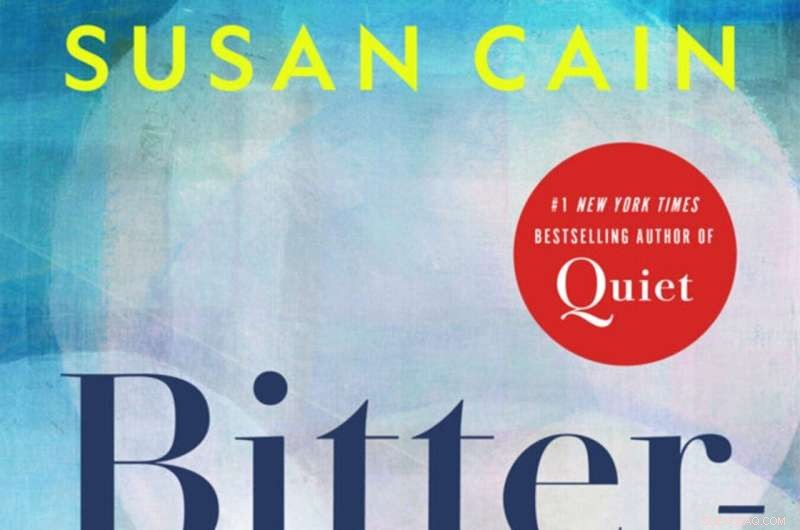Den følelse du får, når du lytter til trist musik? Dens menneskelighed

Susan Cain foretrækker at søge rundt i de mindre undersøgte hjørner af can-do Amerika. I 2012 udgav hun "Quiet:The Power of Introverts in a World That Can't Stop Talking", som blev et fænomen og gjorde de medfødt mindre snakkesalige blandt os moderigtige og endda seje. 1993 Harvard Law School-kandidatens nye bog, "Bittersweet:How Sorrow and Longing Can Make Us Whole", er blevet en New York Times bedst sælgende. The Gazette talte med Cain om, hvordan det at omfavne livets gribende kan føre til kreativitet og forbindelse. Interviewet blev redigeret for klarhed og længde.
GAZETTE:Hvad vil det sige at have en 'bittersød' sindstilstand?
CAIN:Det har at gøre med bevidstheden om, at livet er en blanding af glæde og sorg, lys og mørke, og at alt og alle, du elsker, er uendelige. Jeg oplevede første gang denne sindstilstand, da jeg lyttede til trist musik. Hele mit liv havde jeg denne mystiske reaktion på trist musik; det ville få mig til at føle en følelse af forbindelse til de mennesker, der havde kendt den sorg, som musikeren forsøgte at udtrykke. Først troede jeg, det bare var mig, men da jeg startede min forskning, indså jeg, at mange musikologer har studeret dette, fordi mange mennesker i lang tid har haft denne reaktion ikke kun på musik, men på andre aspekter af den menneskelige oplevelse. . Der er en dyb tradition over hele verden og gennem århundreder af mennesker, der oplever denne højere sindstilstand, der kommer fra en bevidsthed om skrøbelighed og forgængelighed.
GAZETTE:Du skaber en forbindelse mellem denne sindstilstand og religion. Kan du tale lidt om det?
CAIN:Vi lytter til trist musik af samme grund, som vi går i kirke eller synagoge eller moskeen. Vi længes efter Edens Have, vi længes efter Mekka, vi længes efter Zion, fordi vi kommer til denne verden med følelsen af, at der er en mere perfekt og smukkere verden, som vi tilhører, hvor vi ikke længere er. Det føler vi intenst, men vi bliver ikke rigtig opfordret til at formulere det. Alligevel gør vores religioner det for os. Kunsten gør det også. I "Troldmanden fra Oz" længes Dorothy efter et sted "et sted over regnbuen", og Harry Potter længes efter at se sine forældre igen. Dette er en grundlæggende byggesten i enhver menneskelig oplevelse. Det er det, musikken udtrykker, og det er derfor, vi lytter til det, og det er derfor, vi føler os så forbundet med hinanden, når vi gør det, fordi det er vores mest primære tilstand. Men fordi vi alle skal tjene til livets ophold, opdrage vores børn og leve vores liv, er vi ikke så meget i kontakt med disse dybere tilstande. Kunst og musik har en måde at bringe os tilbage på.
GAZETTE:Mange mennesker ville opleve, at det er fint at have et positivt livssyn. Hvad er der galt med det?
CAIN:Der er to ting galt med det. Nummer et er, at det bare ikke fortæller sandheden om nogen menneskelig oplevelse, fordi der ikke er noget menneske, der ikke oplever både glæde og sorg, og lys og mørke. Det er bare en del af menneskelivet. At fortælle hinanden, at vi ikke burde fortælle sandheden om vores oplevelser, er i sagens natur ugyldiggørende. But the deeper reason is that there is something about the melancholic side of our experience that is intimately connected to creativity and to transcendence. We shouldn't want to be robbing ourselves of this experience.
In the book, I developed a bittersweet quiz, with psychologists Dr. Scott Barry Kaufman and Dr. David Yaden, that people can take to measure how likely they are to experience bittersweet states of being. Dr. Kaufman and Dr. Yaden ran some preliminary studies and found that people who score high on the quiz, meaning that they tend to experience bittersweet states of mind, are also more inclined to states that predispose them to creativity, awe, wonder, spirituality, and transcendence. These are some of the most sublime aspects of being human, and they happen to be connected to our appreciation of how fragile life can be, and the impermanence of life.
GAZETTE:Why does sadness get a bad rap in American culture?
CAIN:The U.S. culture since the 19th century has been organized around the idea of winners and losers. This way of thinking originated in the economic sphere, where we started asking, "If somebody succeeded or failed in business, was that a question of good luck or bad luck?" Or "Was it something inside the person that made them have that outcome?" Increasingly, the answer that people arrived at was that it was driven by something within the person, and we started having this dichotomy of seeing each other as winners and losers. The more you have that kind of dichotomy, the more you want to behave in a way that indicates that you're a winner and not a loser. Anything that would be associated with loss, like sorrow, longing, sadness, or melancholia, would be seen as being part of the loser side of the ledger.
Being a winner was associated with being successful and cheerful. Even back in the 19th century, the psychologist William James commented on how it was becoming unfashionable for people to complain about the weather because it was seen as being too negative. During the Great Depression, a common view was to see those who lost everything as losers. In my research, I found a news article with the headline:"Loser Committed Suicide in the Streets." That is astonishing if you think about it, but the use of the word loser has only increased over time.
I would also say that religion has played a role. The U.S. was originally a Calvinist country, and in the Calvinist religion, you were predestined for heaven or hell. There was nothing you could do about it, but you could show that you were one of the people who was going to heaven. The way to do it was by working hard, and then that thinking got transferred later in the 19th century into:"Are you a winner or a loser?"
GAZETTE:Why should people embrace the bittersweet aspects of life? What's in for them?
CAIN:The first thing I would say is to look at the data, which is quite overwhelming. Psychologist Laura Carstensen at Stanford University did some fascinating studies where she showed that people who are attuned to what she calls life's fragility—the fact that our days are numbered—also tend to find a sense of meaning in their lives and have a greater sense of gratitude; they are more focused on their deeper relationships, and they're less likely to feel angry and irritable.
There's also the work by David Yaden, who found that people who are in transitional states of life, including divorce and approaching the end of their lives, also tend to reach those states of mind that Laura Carstensen was talking about. We saw it collectively in the United States after 9/11, when many people turned in the direction of meaning. We saw a huge increase in applications for Teach For America and to take jobs as firefighters, nurses, or teachers. We're seeing that now in the wake of the pandemic, with more applications to medical and nursing schools and people wanting more meaning from their work and personal lives.
GAZETTE:You wrote about the power of introverts in "Quiet." This book is about the strength of embracing a bittersweet outlook on life. Why are you drawn to these underrated aspects of humanity?
CAIN:I think that both these aspects of humanity are connected. I also think there's something about writing books that gives us the permission to discuss things that aren't as easy to talk about in everyday life. To me, the whole point of writing books is to look at the unexamined, the unspeakable, and the unarticulated. I'm just most interested in talking about that which can't be said when we're just chatting at the grocery store.
GAZETTE:What do you hope people will take away from this book?
CAIN:I would like people to be less afraid of experiencing melancholy, sorrow, and longing, and to embrace the powers that bittersweetness has to offer:the powers of creativity, connection, and transcendence. It has been very interesting for me to see the response from readers of "Bittersweet," which is a very different book from "Quiet." But the letters I'm getting from readers of "Bittersweet" are very similar to the ones that I got from those who read "Quiet" in that what people say over and over is, "I feel understood," "I had never been able to give voice to it," "I feel validated." A lot of people write me saying that after reading the book they're realizing that they have suppressed the melancholic side of their nature all their lives, and they're also realizing how valuable that side of their nature is. There has been this curious echo with "Quiet," which I didn't set out to do, but it ended up happening.
 Varme artikler
Varme artikler
-
 Hollandske møllere får frisk vind i sejleneDen hollandske møller Maarten Dolman er en af kun omkring 40 mennesker i Holland, der stadig lever af at lave mel på den hævdvundne måde at male korn gennem vindens kraft i sin vindmølle i den lille
Hollandske møllere får frisk vind i sejleneDen hollandske møller Maarten Dolman er en af kun omkring 40 mennesker i Holland, der stadig lever af at lave mel på den hævdvundne måde at male korn gennem vindens kraft i sin vindmølle i den lille -
 T. Rex snerrer til besøgende i Paris botaniske haveEt skelet af en Tyrannosaurus Rex -dinosaur vil blive vist på det franske naturhistoriske museum i Paris Trix, en otte ton Tyrannosaurus rex, finder et hjem på Paris Jardin des Plantes i tre måned
T. Rex snerrer til besøgende i Paris botaniske haveEt skelet af en Tyrannosaurus Rex -dinosaur vil blive vist på det franske naturhistoriske museum i Paris Trix, en otte ton Tyrannosaurus rex, finder et hjem på Paris Jardin des Plantes i tre måned -
 Fungerer fleksibelt arbejde for australske forældre?Kredit:CC0 Public Domain En australsk undersøgelse, der undersøger forholdet mellem fleksibilitet og forældres sundhed, har afsløret, at formelle familievenlige arbejdssteder alene ikke opfylder k
Fungerer fleksibelt arbejde for australske forældre?Kredit:CC0 Public Domain En australsk undersøgelse, der undersøger forholdet mellem fleksibilitet og forældres sundhed, har afsløret, at formelle familievenlige arbejdssteder alene ikke opfylder k -
 Over en fjerdedel af dem, der engagerer sig i tweets på e-sportsvæddemål i Storbritannien, er bø…Kredit:CC0 Public Domain Over en fjerdedel af dem, der engagerer sig i tweets med e-sportsvæddemål, er børn under 16 år, ifølge en ny rapport, der antyder, at e-sportsspil kan være lige så attrakt
Over en fjerdedel af dem, der engagerer sig i tweets på e-sportsvæddemål i Storbritannien, er bø…Kredit:CC0 Public Domain Over en fjerdedel af dem, der engagerer sig i tweets med e-sportsvæddemål, er børn under 16 år, ifølge en ny rapport, der antyder, at e-sportsspil kan være lige så attrakt
- Nyt materiale baner vejen for fjernstyret medicin og elektroniske piller
- Med et hop, et spring og et spring, højtflyvende robot springer let over forhindringer
- Opdel det:Forstå dannelsen af kemiske biprodukter under vandbehandling
- Afkøling med det koldeste stof i verden
- Lad os se væske-væske grænsefladen
- Hubble fanger en galakseduo ved haren


